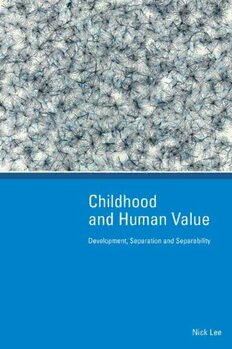
Childhood and Human Value PDF
177 Pages·2005·2.426 MB·English
Most books are stored in the elastic cloud where traffic is expensive. For this reason, we have a limit on daily download.
Preview Childhood and Human Value
Description:
'At the centre of Nick Lee's new book is a subtle exploration of the 'separability' of adults and children. Through this the recent emergence of children as participants in social life is given a fresh perspective, one that is unsettling to opponents and proponents of children's rights alike. Crucial to this, he addresses the relationship between children and adults as part of their shared but problematic human becoming, thus setting out what should, in my view, be the main terrain of childhood studies. This is a book that all scholars of childhood should read and from which they will gain immensely' - Alan Prout, Professor of Sociology, University of Stirling. For millennia children have been valued as possessions - valued by their parents as 'my' child and valued by communities and cultures as 'belonging' to them. Recently, a new way of valuing children has emerged - valuing them as people in possession of themselves, as people who have rights.This has led to fears that rights will erode love between parents and children, and separate children from their communities and cultures. "Childhood and Human Value" explains why people feel this way and argues that they are mistaken. Adults in modern societies have separation anxieties about children's rights, because they are used to measuring human value against a standard of 'separateness'. The more separate you appear to be from the opinions and control of others, the more valuable you seem. This highly original and accessible book shows us how to resolve the conflict between 'love' and 'rights' in contemporary relationships between adults and children. Examining a number of Twentieth Century developmental thinkers, including Vygotsky, Winnicott, Gilligan and Deleuze and Guattari, Nick Lee argues that a more flexible and realistic understanding of the sources of human value is available to us, based on 'separability'. "Childhood and Human Value" is key reading for students in a variety of fields including sociology of childhood, family studies, sociology of education, psychology of development, and childhood studies. It is also of interest to professionals who work with children, for example social workers, teachers, and the police.
See more
The list of books you might like
Most books are stored in the elastic cloud where traffic is expensive. For this reason, we have a limit on daily download.
